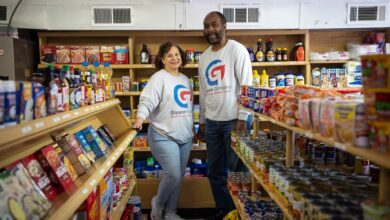The Black-owned Bookstores Changing The Houston Landscape

When walking into Class, one can be forgiven for initially believing it’s a hot new art gallery or fashion house… at least before setting eyes on the shelves upon shelves of books along the walls. It’s airy and bright, including a single gold Nike (ask about its origin story) and a memorial to Tupac among the décor.
This is by design. David Landry, who co-owns Class alongside his wife Dara, deliberately evokes boutique spaces with a “white walls, very clean, simple” aesthetic.
“We love sneakers and we love streetwear. We wanted it to have that kind of a look and feel,” he says. “We also wanted it to be very welcoming. All the spaces and places that we liked to do commerce at had that same common feel. You weren’t necessarily forced to shop or buy things.”
In addition to Kindred Stories, which opened in 2021, Class is one of only two Black-owned brick-and-mortar bookstores in Houston. Katy-based Brown Sugar Café and Books currently operates exclusively online after suspending its in-person operations last year. Twenty-two percent of Houstonians are Black, according to the most recent census data. The city has the population and the land to sustain more than two, especially since both Class and Kindred Stories are both based in Third Ward. Class is located in former student housing next door to the Texas Southern University Campus; Kindred Stories is one street over from the historic Eldorado Ballroom, near Emancipation Park.
According to We Need Diverse Books, Statista numbers indicate that only 6% of the 10,800 independent bookstores in the United States are owned by Black bibliophiles. Some of this can be attributed to racial discrimination in lending. Although it is illegal to deny loans based on race, a 2023 study published in the Journal of Marketing Research showed that Black entrepreneurs are still issued fewer bank loans when compared to their White counterparts, even when said White counterparts have lower FICO scores, weaker portfolios, and less business leadership experience.
Investments directly from the Houston-area Black community and nonprofits stepped up to help make Kindred Stories and Class possible.
“[Project Row Houses has] a small business incubation program, which is why we are here. So we were offered the chance to spend the next two to three years learning if this business was sustainable, with cheaper rent and utilities handled,” says Chanecka Williams, store manager at Kindred Stories. “The goal is to grow out of the place and find your footing… They have been huge supporters, making sure Black businesses have a chance to be here, as well as making sure that there are things in the neighborhood to do for the folks who still live here and have lived here for decades.”
Class began life as an online bookstore and occasional in-person presence at pop-ups and markets before officially opening as a brick-and-mortar in 2022. The Landries were accepted into a 10-week entrepreneurship course offered by the Emancipation Economic Development Council in 2020. Additional support soon followed.
“I want to say shout out to John Nicklos, because he was very adamant about there being a black owned bookstore, in the city of Houston, in the Third Ward. And he was like, ‘Yo, I got another opportunity for you. It’s not much funding, but it’s a start,’” says Landry. “He hooked us up. We got $1,000. We did another short workshop type of deal and ended up getting $1,000. And we took that $1,000 and spent it on setting up our website, postage. We bought a thermal printer for labels, and then we bought the materials to ship things. And then we bought a little bit of inventory.”
The Black community placed support and care into Class and Kindred Stories, and both shops host a variety of events to help promote Black authors, poets, artists, and thinkers. Kindred Stories has book clubs for adults and kids, and Class has opened its doors to town halls for political candidates and open mic nights.
Landry points out the necessity of book shops as safe havens for Black culture and thought to thrive. Many older Third Ward residents don’t want to socialize at bars or loud restaurants, and people with kids want to take them out for entertainment and education where they’ll be welcomed. There is no community without inclusivity.
These bookstores also help create visibility for underrepresented demographics in literature. Black workers only make up 5% of the publishing industry and 5.9% of authors. The talent is there, but not always the opportunity.
“[Kindred Stories founder] Terri Hamm had two young children who were exploring, huge readers, everybody in their family. Her daughter was looking for a place to explore more relaxed stories, because she was going to a Barnes & Noble or an independent bookstore… but there just wasn’t enough Black authors. So she was really craving that,” Williams says. “Terri had decided to dream up a space where everybody will be able to explore the complexities and intersectionality of Black identities and literature.”
Williams notes that Kindred Stories does not have a bestseller section because they want to encourage visitors to explore the store and find unexpected gems along the way. Highlighting what everyone else is reading can deter bibliophiles from seeking out their own personal surprises.
“We don’t want anything hindering you from receiving a story,” she says. “But there are some areas of the store that are definitely more popular than others. Sci-fi and fantasy definitely is, since Octavia Butler’s sort of revival into sci-fi and fantasy.”
At Class, the Landries curate their shelves based on collecting community feedback.
“It literally started from us looking at our home library, and just taking note of things that people were interested in when they would come over,” Landry says. “And then also, it was personal curation. Things that we were interested in that we felt like other people should know about. We included those books. And then once we start doing the pop ups, we start taking recommendations from customers.”
The store also has a free bookshelf, as the owners believe that cost shouldn’t be a barrier to entry when accessing Black authors. It isn’t a “take a book, leave a book” arrangement, either, as “doesn’t benefit [them] to hoard any of this stuff.” To the Landries, the free books are just another way to grow their community around nurturing a love for the written word, and ensure that Black authors enjoy a more expansive audience.
























































